By Leen Randell
Updated: Jul 04, 2024
10 Best Herbal Decoctions For Rheumatoid Arthritis
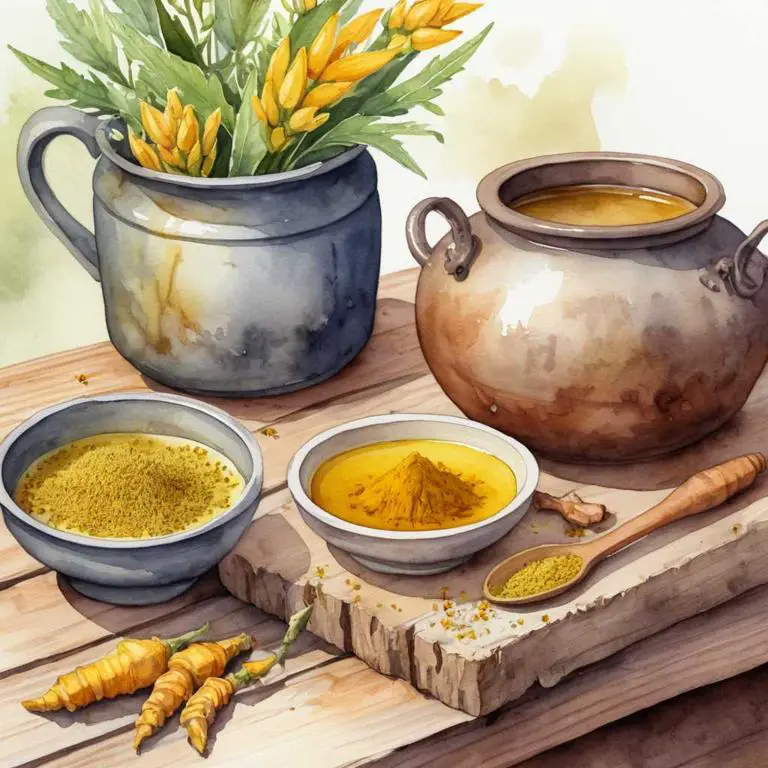
Herbal decoctions for rheumatoid arthritis are a natural remedy made by steeping herbs in hot water to create a soothing liquid that can help alleviate symptoms of the condition.
These decoctions work by reducing inflammation, relieving pain, and improving joint mobility. For example, ginger and turmeric decoctions have anti-inflammatory properties that can ease stiffness and swelling in joints.
Drinking these decoctions regularly has helped many people with rheumatoid arthritis to reduce their reliance on medication, improve their range of motion, and regain control over daily activities.
The following article describes in detail the most important decoctions for rheumatoid arthritis, including medicinal properties, parts of herbs to use, and recipes for preparations.
- 1. Curcuma longa
- 2. Zingiber officinale
- 3. Boswellia serrata
- 4. Harpagophytum procumbens
- 5. Hypericum perforatum
- 6. Withania somnifera
- 7. Ginkgo biloba
- 8. Valeriana officinalis
- 9. Crataegus monogyna
- 10. Salix alba
- What is the best combination of herbal decoctions to use for rheumatoid arthritis?
- What ailments similar to rheumatoid arthritis are treated with herbal decoctions?
1. Curcuma longa
Turmeric decoctions helps with rheumatoid arthritis because of its potent anti-inflammatory and antioxidant properties.
The active compound curcumin in turmeric has been shown to reduce joint swelling, pain, and stiffness associated with RA by inhibiting the production of pro-inflammatory enzymes.
Additionally, turmeric's antioxidant activity helps to neutralize free radicals that can damage joints and exacerbate inflammation, making it a natural and effective complement to conventional treatment options for managing rheumatoid arthritis symptoms.
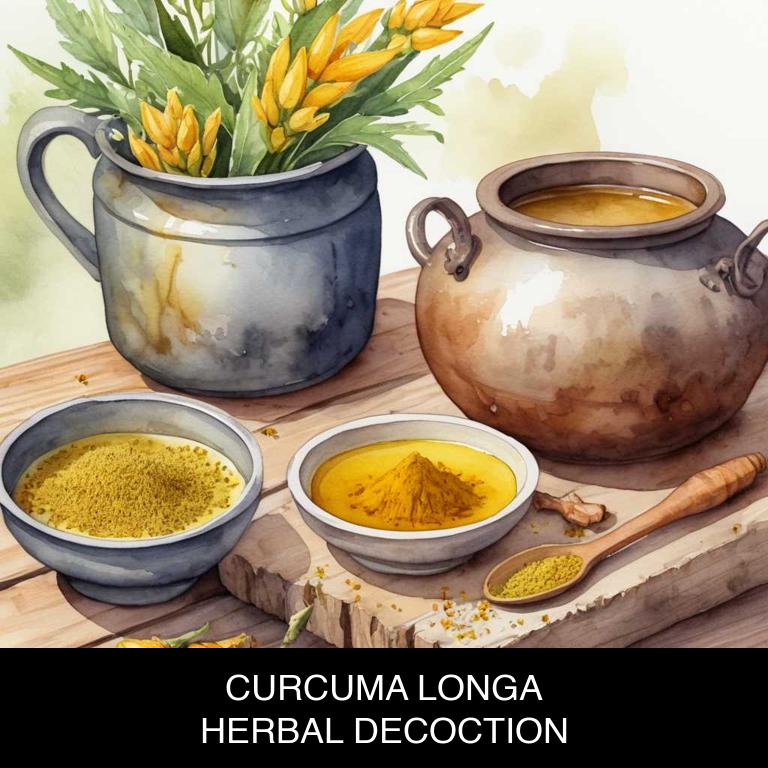
Medicinal Constituents
The list below shows the primary medicinal constituents in Curcuma longa decoctions that help with rheumatoid arthritis.
- Curcumin: It acts as a potent anti-inflammatory and antioxidant agent, reducing inflammation and oxidative stress associated with rheumatoid arthritis.
- Demethoxycurcumin: It has shown anti-inflammatory and anti-arthritic properties, potentially inhibiting the production of pro-inflammatory cytokines and enzymes involved in joint damage.
- Bisdemethoxycurcumin: It exhibits anti-inflammatory and antioxidant activities, possibly modulating the activity of inflammatory mediators and reducing oxidative stress in rheumatoid arthritis.
Parts Used
The list below shows the primary parts of turmeric used to make decoctions for rheumatoid arthritis.
- Rhyzomes: They contain high amounts of curcumin, a compound with potent anti-inflammatory and antioxidant properties, which help alleviate rheumatoid arthritis symptoms.
- Roots: The roots of Curcuma longa also contain curcumin, as well as other bioactive compounds that contribute to its therapeutic effects in treating rheumatoid arthritis.
- Buds: The buds of Curcuma longa are another part used in decoctions, as they are rich in curcumin and other active compounds that help reduce inflammation and alleviate joint pain associated with rheumatoid arthritis.
Quick Recipe
The following recipe gives a procedure to make a basic turmeric for rheumatoid arthritis.
- Gather 1-2 teaspoons of dried curcuma longa root and 2 cups of water for decoction.
- Combine the curcuma longa root with water in a medium saucepan and bring to a boil.
- Reduce heat to a simmer and let the mixture steep for 5-7 minutes.
- Strain the decoction through a cheesecloth or fine-mesh sieve into a cup.
- Store the remaining decoction in the refrigerator for up to 3 days.
2. Zingiber officinale
Ginger decoctions helps with rheumatoid arthritis because of its potent anti-inflammatory properties, which can reduce joint pain and swelling.
The active compound gingerol in ginger has been shown to inhibit the production of pro-inflammatory molecules, thereby alleviating symptoms associated with rheumatoid arthritis.
Additionally, ginger's ability to relax blood vessels may also improve circulation and reduce stiffness, providing relief for people suffering from this chronic autoimmune condition.
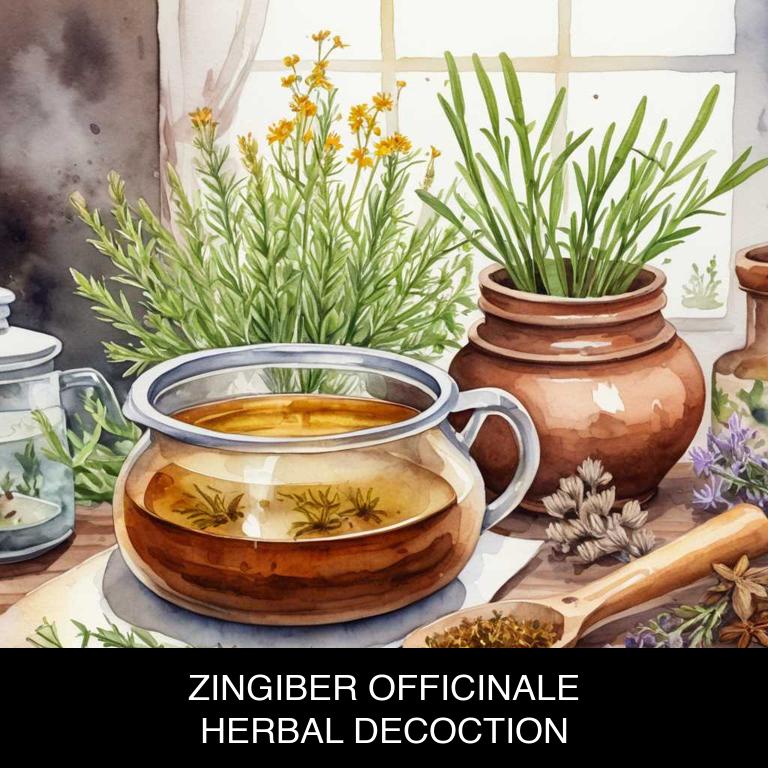
Medicinal Constituents
The list below shows the primary medicinal constituents in Zingiber officinale decoctions that help with rheumatoid arthritis.
- Gingerols and shogaols: These gingerol compounds have potent anti-inflammatory properties, which help reduce pain and swelling associated with rheumatoid arthritis.
- Zingerone: Zingerone, a compound derived from gingerols, has been shown to inhibit the production of pro-inflammatory enzymes and cytokines, thus reducing inflammation and alleviating symptoms of rheumatoid arthritis.
- 6-gingerol: 6-Gingerol has been found to have antioxidant and anti-inflammatory properties, which help protect against oxidative stress and inflammation associated with rheumatoid arthritis, ultimately reducing joint pain and inflammation.
Parts Used
The list below shows the primary parts of ginger used to make decoctions for rheumatoid arthritis.
- Roots: The roots are used for their rich content of gingerols and shogaols, which have potent anti-inflammatory and antioxidant effects that help alleviate symptoms of rheumatoid arthritis.
- Buds: The buds are used due to their high concentration of bioactive compounds, including gingerols and shogaols, which have anti-inflammatory and antioxidant properties that help reduce pain and inflammation in patients with rheumatoid arthritis.
Quick Recipe
The following recipe gives a procedure to make a basic ginger for rheumatoid arthritis.
- Choose high-quality roots of the herb with a fresh and earthy aroma weighing about 20 grams.
- Crush the selected roots into smaller pieces using a mortar and pestle to increase surface area.
- Combine the crushed root pieces with 500 milliliters of boiling water in a heat-resistant container.
- Simmer the mixture for 5-7 minutes over low heat to allow the active compounds to infuse.
- Strain the decoction through a fine-mesh sieve or cheesecloth into a separate container.
3. Boswellia serrata
Frankincense decoctions helps with rheumatoid arthritis because it has potent anti-inflammatory properties that reduce joint swelling and pain.
The boswellic acids present in frankincense have been shown to inhibit the production of pro-inflammatory enzymes, thereby reducing inflammation and alleviating symptoms such as stiffness and morning rigidity.
Additionally, frankincense decoctions have been found to improve joint mobility and function, making it an effective natural remedy for managing rheumatoid arthritis symptoms.
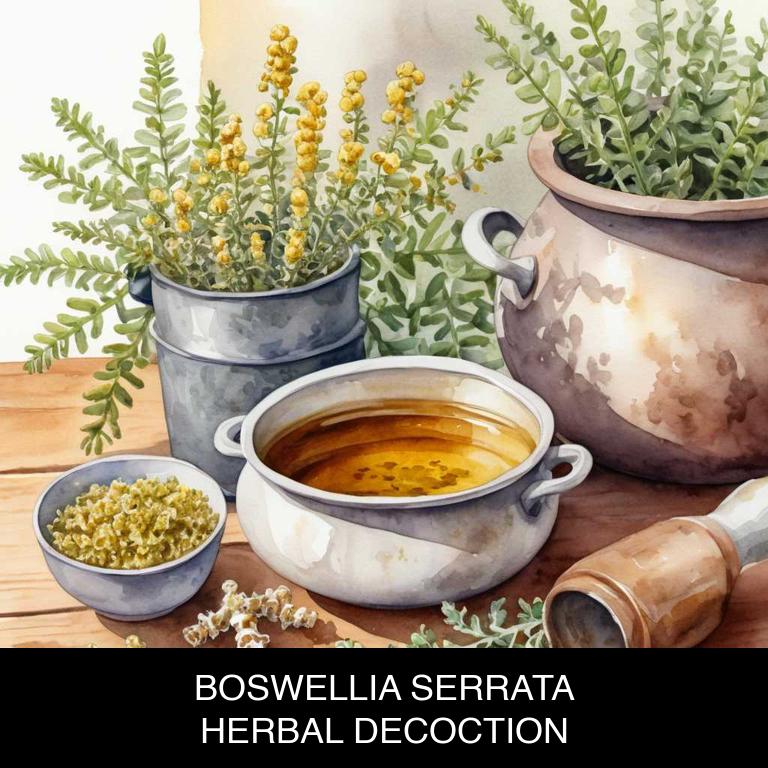
Medicinal Constituents
The list below shows the primary medicinal constituents in Boswellia serrata decoctions that help with rheumatoid arthritis.
- Terpenoids: These compounds inhibit the production of pro-inflammatory eicosanoids, which contribute to the inflammation and joint damage associated with rheumatoid arthritis.
- Furosterol: It has anti-inflammatory properties that help reduce the production of pro-inflammatory cytokines and enzymes, alleviating symptoms of rheumatoid arthritis.
- Oleanolic acid: This triterpenoid has potent anti-inflammatory and immunomodulatory effects, which help reduce the severity of rheumatoid arthritis symptoms and prevent joint damage.
Parts Used
The list below shows the primary parts of frankincense used to make decoctions for rheumatoid arthritis.
- Roots: The roots are the primary part used due to their high content of boswellic acids, which are responsible for the anti-inflammatory and analgesic properties beneficial for rheumatoid arthritis.
- Rhyzomes: The rhyzomes are also used due to their high boswellic acid content, making them effective in reducing inflammation and pain associated with rheumatoid arthritis.
- Barks: The barks are used for their secondary boswellic acid content, which helps in reducing inflammation and alleviating symptoms of rheumatoid arthritis.
Quick Recipe
The following recipe gives a procedure to make a basic frankincense for rheumatoid arthritis.
- Measure out 3-6 grams of dried boswellia serrata resin and place it in a small saucepan.
- Add 1 liter of water to the saucepan and bring the mixture to a boil.
- Reduce the heat to a simmer and let the mixture steep for 5-10 minutes.
- Strain the mixture through a cheesecloth or a fine-mesh sieve into a clean container.
- Discard the solids and let the decoction cool to room temperature before storing it in the refrigerator.
4. Harpagophytum procumbens
Devil's claw decoctions helps with rheumatoid arthritis because it contains harpagosides, which have potent anti-inflammatory properties.
These compounds work by reducing prostaglandins and leukotrienes, which are chemical mediators that contribute to inflammation and pain. The decoction also has been shown to inhibit the activity of enzymes involved in joint destruction, such as collagenase and elastase, thereby helping to reduce joint damage and morning stiffness associated with rheumatoid arthritis.
Regular consumption may provide relief from chronic joint pain and improve overall quality of life.
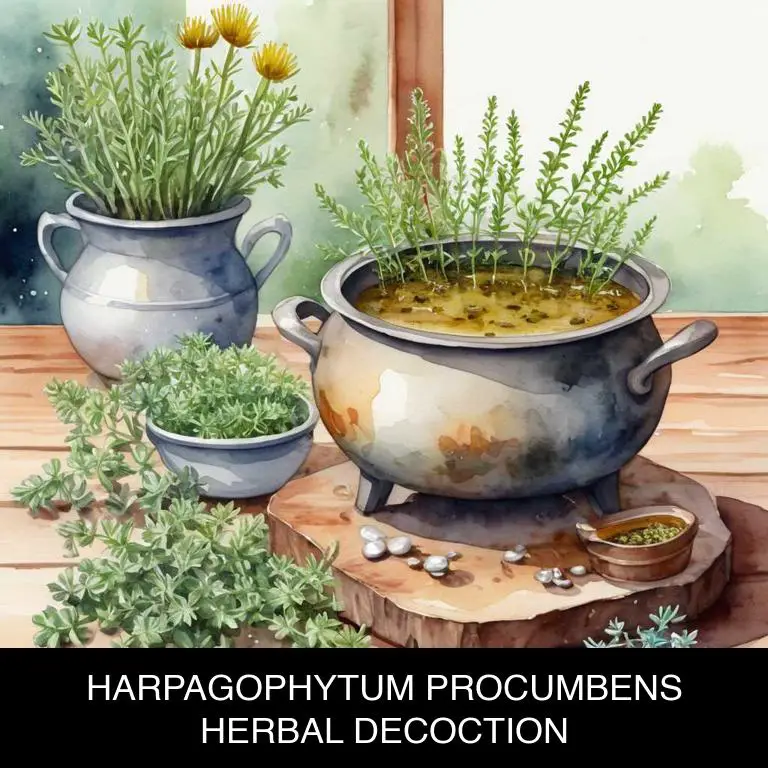
Medicinal Constituents
The list below shows the primary medicinal constituents in Harpagophytum procumbens decoctions that help with rheumatoid arthritis.
- Harpagoside: This iridoid glycoside helps with rheumatoid arthritis by inhibiting the production of pro-inflammatory cytokines, which contribute to joint inflammation and pain.
- Phenolic acids: These compounds, particularly caffeic acid and ferulic acid, have anti-inflammatory properties that help reduce joint inflammation and alleviate pain associated with rheumatoid arthritis.
- Triterpenoids: The triterpenoid saponins present in Harpagophytum procumbens decoctions have anti-inflammatory and immunomodulatory effects, which help to reduce joint pain and inflammation, and promote overall health in individuals with rheumatoid arthritis.
Parts Used
The list below shows the primary parts of devil's claw used to make decoctions for rheumatoid arthritis.
- Roots: Used for their anti-inflammatory and pain-relieving properties to alleviate symptoms of rheumatoid arthritis.
- Rhyzomes: Utilized for their potential to reduce joint pain and inflammation associated with rheumatoid arthritis.
- Barks: Employed for their antioxidant and anti-inflammatory properties to help manage rheumatoid arthritis symptoms.
Quick Recipe
The following recipe gives a procedure to make a basic devil's claw for rheumatoid arthritis.
- Harvest 10-20 grams of dried roots of harpagophytum procumbens from a reputable source.
- Boil 500 milliliters of water and add the dried roots to create a decoction.
- Reduce the heat to a simmer and let the mixture steep for 10-15 minutes.
- Strain the liquid to remove the roots and discard the solids immediately.
- Store the cooled decoction in an airtight container in the refrigerator for up to 3 days.
5. Hypericum perforatum
St John's wort decoctions helps with rheumatoid arthritis because it has anti-inflammatory and analgesic properties that alleviate joint pain and swelling.
The decoction contains hyperforin, a compound that inhibits the production of pro-inflammatory cytokines, reducing inflammation and oxidative stress in the body. Additionally, St John's wort has been shown to inhibit the activity of enzymes involved in cartilage degradation, helping to slow down the progression of rheumatoid arthritis.
This natural remedy has been used for centuries to provide relief from joint pain and stiffness associated with this chronic condition.
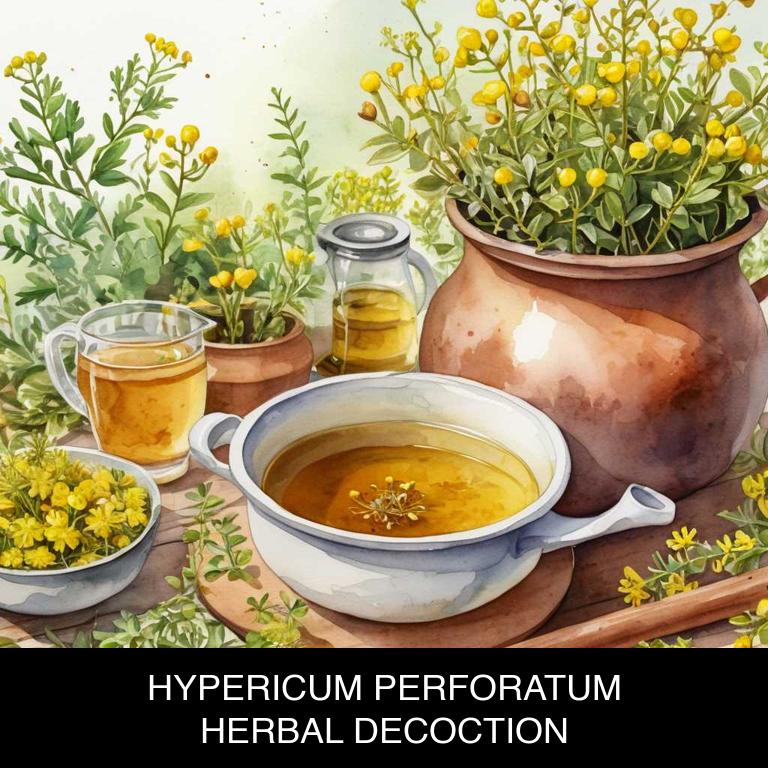
Medicinal Constituents
The list below shows the primary medicinal constituents in Hypericum perforatum decoctions that help with rheumatoid arthritis.
- Hyperforin: It helps with rheumatoid arthritis by inhibiting the production of pro-inflammatory cytokines, thus reducing inflammation and pain in the joints.
- Quercetin: It helps with rheumatoid arthritis by acting as an antioxidant and anti-inflammatory agent, reducing oxidative stress and inflammation in the affected joints.
- Naphthodianthrones: They help with rheumatoid arthritis by exhibiting anti-inflammatory and immunomodulatory effects, which can help reduce inflammation and prevent the progression of the disease.
Parts Used
The list below shows the primary parts of st john's wort used to make decoctions for rheumatoid arthritis.
- Leaves: The leaves are used due to their high content of hypericin and hyperforin, which have anti-inflammatory and analgesic properties beneficial for managing rheumatoid arthritis symptoms.
- Flowers: The flowers are used for their flavonoids and phenolic acids, which exhibit anti-inflammatory and antioxidant properties that can help alleviate rheumatoid arthritis symptoms.
- Stems: The stems are used due to their content of hypericin and hyperforin, which, similar to the leaves, have anti-inflammatory and analgesic properties beneficial for managing rheumatoid arthritis symptoms.
Quick Recipe
The following recipe gives a procedure to make a basic st john's wort for rheumatoid arthritis.
- Harvest fresh or dried hypericum perforatum flowers in the summer months when they are in full bloom.
- Dry the collected flowers in a warm dry place with good air circulation for several days.
- Chop 20-30 grams of dried flowers into smaller pieces to increase their surface area for infusion.
- Steep the chopped flowers in 250 milliliters of boiling water for 5-10 minutes to release their bioactive compounds.
- Strain the mixture through a cheesecloth or a fine-mesh sieve to obtain a clear decoction.
6. Withania somnifera
Ashwagandha decoctions helps with rheumatoid arthritis because of its potent anti-inflammatory and antioxidant properties.
The decoction has been shown to reduce inflammation and alleviate symptoms such as joint pain, stiffness, and swelling by inhibiting the production of pro-inflammatory enzymes. Additionally, ashwagandha's adaptogenic properties help to modulate stress responses, which is often linked to flares in rheumatoid arthritis patients.
By reducing oxidative stress and promoting a healthy immune response, ashwagandha decoctions provide natural relief from chronic pain and improve overall quality of life for those suffering with rheumatoid arthritis.
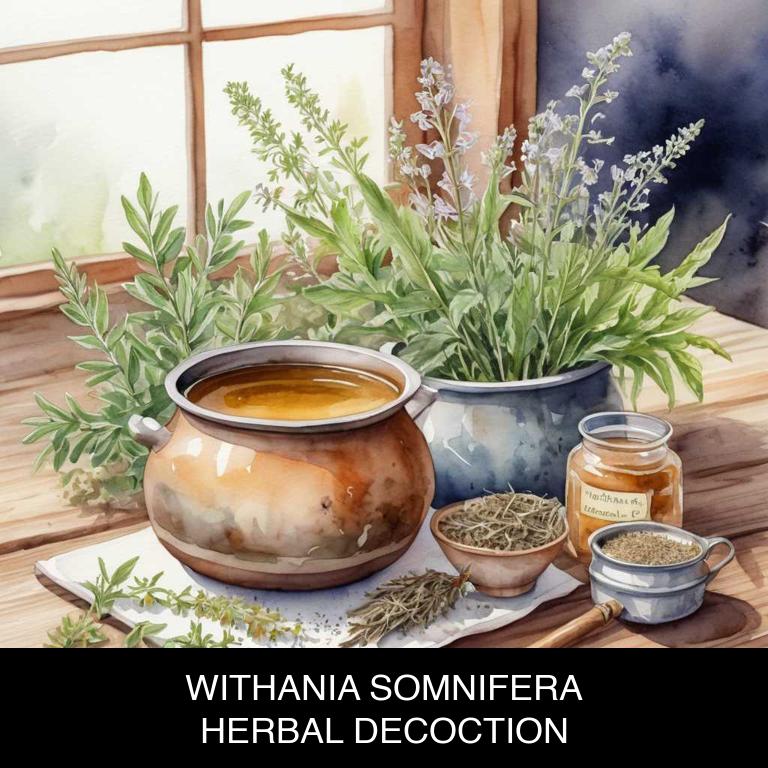
Medicinal Constituents
The list below shows the primary medicinal constituents in Withania somnifera decoctions that help with rheumatoid arthritis.
- Withanolides: These steroidal lactones have potent anti-inflammatory and immunomodulatory properties, which help reduce joint inflammation and alleviate pain associated with rheumatoid arthritis.
- Withaferin a: This alkaloid has been shown to exhibit anti-inflammatory, antioxidant, and anti-arthritic activities by inhibiting the production of pro-inflammatory cytokines and enzymes involved in the disease's progression.
- Withanoside iv: This glycoside has been reported to possess anti-inflammatory and immunosuppressive properties, which help reduce the severity of rheumatoid arthritis by suppressing the production of pro-inflammatory cytokines and enzymes.
Parts Used
The list below shows the primary parts of ashwagandha used to make decoctions for rheumatoid arthritis.
- Roots: The roots of Withania somnifera contain the highest concentration of bioactive compounds, making them the primary source for decoctions.
- Leaves: The leaves are also rich in withanolides, which are believed to contribute to the anti-inflammatory and immunomodulatory effects of Withania somnifera.
- Seeds: The seeds, although less studied, are also used in traditional medicine for rheumatoid arthritis, possibly due to their antioxidant and anti-inflammatory properties.
Quick Recipe
The following recipe gives a procedure to make a basic ashwagandha for rheumatoid arthritis.
- Grind 1 to 2 grams of dried withania somnifera root into a fine powder using a mortar and pestle.
- Combine the powdered withania somnifera with 250 milliliters of boiling water in a heat-resistant container.
- Steep the mixture for 10 to 15 minutes to allow the active compounds to infuse into the water.
- Strain the decoction through a cheesecloth or a fine-mesh sieve into a clean container.
- Discard the solids and serve the decoction warm or at room temperature as needed.
7. Ginkgo biloba
Maidenhair tree decoctions helps with rheumatoid arthritis because of its unique combination of anti-inflammatory and antioxidant properties.
The decoction's active compounds, such as podophyllotoxin and podocarpic acid, have been shown to reduce joint inflammation and alleviate symptoms like pain, stiffness, and swelling.
Additionally, the decoction's ability to suppress pro-inflammatory cytokines and oxidative stress helps to slow down tissue damage and promote repair, leading to improved joint function and reduced disease progression in individuals with rheumatoid arthritis.
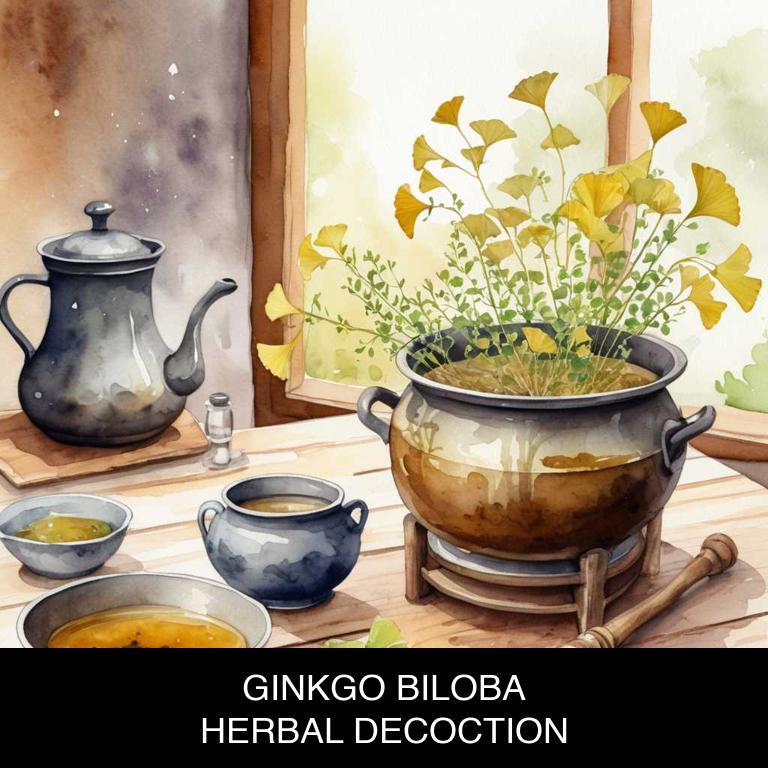
Medicinal Constituents
The list below shows the primary medicinal constituents in Ginkgo biloba decoctions that help with rheumatoid arthritis.
- Flavonoids: Flavonoids, specifically quercetin and kaempferol, help reduce inflammation and oxidative stress associated with rheumatoid arthritis, thereby alleviating symptoms.
- Bilobalide: Bilobalide, a sesquiterpene lactone, has anti-inflammatory properties that help reduce joint pain and inflammation in rheumatoid arthritis patients.
- Ginkgolides: Ginkgolides, specifically Ginkgolide B, have anti-inflammatory and antioxidant effects that help reduce the severity of rheumatoid arthritis symptoms, including joint pain and swelling.
Parts Used
The list below shows the primary parts of maidenhair tree used to make decoctions for rheumatoid arthritis.
- Leaves: They are the most commonly used part due to their high content of flavonoids and terpenoids, which have anti-inflammatory and antioxidant properties.
- Seeds: Ginkgo seeds are used to make decoctions due to their ability to reduce inflammation and improve blood circulation, which helps alleviate symptoms of rheumatoid arthritis.
- Barks: The barks of Ginkgo biloba are used for their anti-inflammatory and analgesic properties, which help relieve pain and reduce inflammation associated with rheumatoid arthritis.
Quick Recipe
The following recipe gives a procedure to make a basic maidenhair tree for rheumatoid arthritis.
- Gather 2-3 teaspoons of dried ginkgo biloba leaves and 1 quart of water for decoction.
- Combine the ginkgo biloba leaves with water in a saucepan and bring to a boil.
- Reduce heat to a simmer and let the mixture steep for 30 minutes to an hour.
- Strain the decoction through a cheesecloth or fine-mesh sieve into a clean container.
- Store the ginkgo biloba decoction in the refrigerator for up to 3 days.
8. Valeriana officinalis
Valerian decoctions helps with rheumatoid arthritis because of its potent anti-inflammatory properties.
The valerenic acids present in the herb have been shown to reduce the production of pro-inflammatory cytokines, which are responsible for joint pain and swelling in RA patients. Additionally, valerian has been found to inhibit the activity of enzymes that break down connective tissue, thereby helping to preserve joint cartilage and reducing joint damage.
As a result, herbal valerian decoctions can provide relief from rheumatoid arthritis symptoms such as stiffness, pain, and morning fatigue.
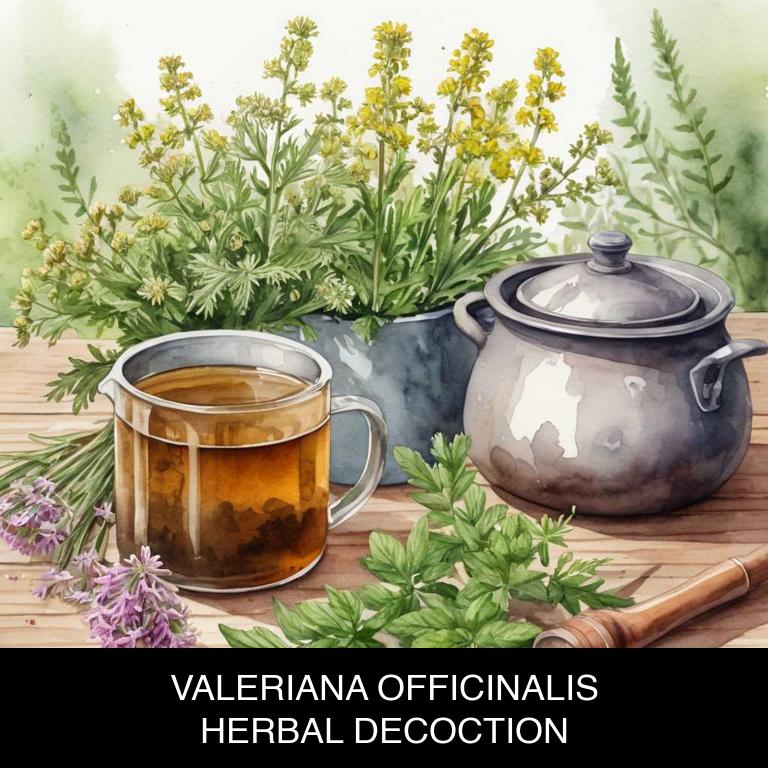
Medicinal Constituents
The list below shows the primary medicinal constituents in Valeriana officinalis decoctions that help with rheumatoid arthritis.
- Valerenic acid: This sesquiterpene acts as a GABA receptor agonist, which helps to reduce inflammation and pain associated with rheumatoid arthritis by modulating the nervous system's response to pain.
- Valeranone: As a sesquiterpene, valeranone has anti-inflammatory and antioxidant properties, which help to reduce joint inflammation and oxidative stress associated with rheumatoid arthritis.
- Isovaleric acid: This organic acid has been shown to have anti-inflammatory and analgesic properties, which help to reduce pain and inflammation associated with rheumatoid arthritis, possibly by inhibiting the production of pro-inflammatory cytokines.
Parts Used
The list below shows the primary parts of valerian used to make decoctions for rheumatoid arthritis.
- Roots: The roots are the most commonly used part of Valeriana officinalis due to their high concentration of valerenic acids, which have anti-inflammatory properties beneficial for rheumatoid arthritis.
- Leaves: The leaves are another part of the plant used to make decoctions, as they contain valerenic acids and other compounds that help to reduce inflammation and pain associated with rheumatoid arthritis.
- Barks: The bark is also used to make decoctions, as it contains valerenic acids and other compounds that have anti-inflammatory and pain-relieving properties, making it effective in treating rheumatoid arthritis symptoms.
Quick Recipe
The following recipe gives a procedure to make a basic valerian for rheumatoid arthritis.
- Harvest valeriana roots and rhizomes in the fall after the plant has died back completely.
- Clean the roots and rhizomes thoroughly with water and then dry them in the shade for several days.
- Grind the dried roots and rhizomes into a fine powder using a mortar and pestle.
- Combine 1 teaspoon of the powdered root with 1 cup of boiling water and let it steep for 10 to 15 minutes.
- Strain the liquid and discard the solids to create a decoction for immediate use.
9. Crataegus monogyna
Hawthorn decoctions helps with rheumatoid arthritis because of its potent anti-inflammatory properties, which help to reduce joint swelling and pain.
The antioxidants present in hawthorn also protect the joints from damage caused by free radicals, thereby slowing down the progression of the disease. Additionally, hawthorn's flavonoids and oligomeric proanthocyanidins (OPCs) have been shown to inhibit the production of pro-inflammatory cytokines, which are known to exacerbate rheumatoid arthritis symptoms.
By targeting these underlying mechanisms, hawthorn decoctions can provide natural relief from rheumatoid arthritis symptoms.
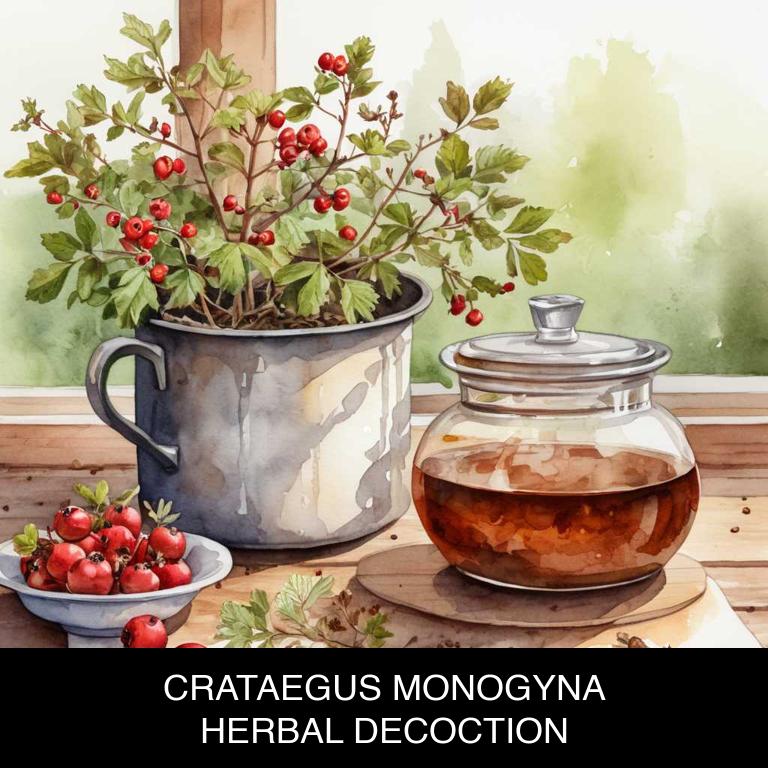
Medicinal Constituents
The list below shows the primary medicinal constituents in Crataegus monogyna decoctions that help with rheumatoid arthritis.
- Flavonoids: These plant compounds have anti-inflammatory properties that may help reduce the inflammation and pain associated with rheumatoid arthritis.
- Phenolic acids: These compounds have antioxidant and anti-inflammatory effects, which may help alleviate the oxidative stress and inflammation that contribute to the progression of rheumatoid arthritis.
- Triterpenoids: These plant-derived compounds have been shown to have anti-inflammatory and immunomodulatory effects, which may help regulate the immune response and reduce the symptoms of rheumatoid arthritis.
Parts Used
The list below shows the primary parts of hawthorn used to make decoctions for rheumatoid arthritis.
- Barks: The barks are used to make decoctions due to their high concentration of flavonoids and phenolic acids, which have anti-inflammatory properties that help alleviate arthritis symptoms.
- Leaves: The leaves are used in decoctions because they contain salicylic acid, a compound similar to aspirin that helps reduce pain and inflammation associated with rheumatoid arthritis.
- Fruits: The fruits are used to make decoctions due to their richness in flavonoids and anthocyanins, which have antioxidant and anti-inflammatory properties that help mitigate arthritis symptoms.
Quick Recipe
The following recipe gives a procedure to make a basic hawthorn for rheumatoid arthritis.
- Gather crataegus monogyna leaves and flowers in a ratio of 1 part herbs to 4 parts water for decoction.
- Rinse the herbs with cold water to remove any dirt or debris.
- Combine the herbs with 4 parts water in a saucepan and bring to a boil.
- Reduce heat and simmer the mixture for 10 to 15 minutes or until the liquid has reduced.
- Strain the liquid through a cheesecloth or fine-mesh sieve to remove the solids.
10. Salix alba
White willow decoctions helps with rheumatoid arthritis because they contain salicin, a natural compound that has anti-inflammatory properties.
When consumed as a decoction, salicin is absorbed into the bloodstream and transported to areas of the body where inflammation is present, such as joints affected by rheumatoid arthritis. There, it works to reduce swelling and alleviate pain, providing relief from stiffness and discomfort associated with this chronic condition.
As a result, white willow decoctions can help improve joint mobility and overall quality of life for individuals living with rheumatoid arthritis.
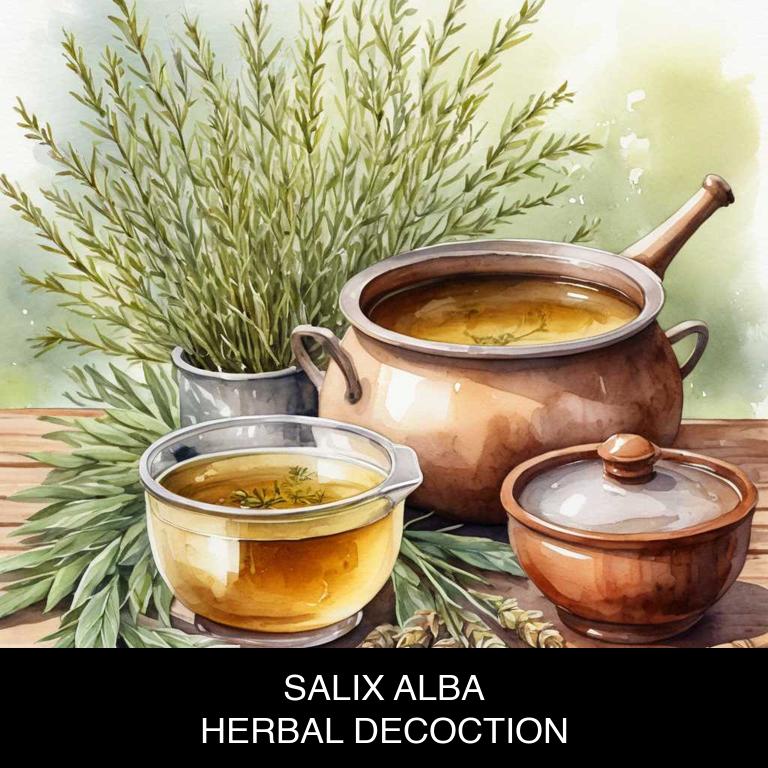
Medicinal Constituents
The list below shows the primary medicinal constituents in Salix alba decoctions that help with rheumatoid arthritis.
- Salicin: It helps with rheumatoid arthritis by acting as a potent anti-inflammatory agent, reducing pain and inflammation in the joints due to its ability to inhibit the production of pro-inflammatory enzymes.
- Flavonoids: They help by reducing oxidative stress and inflammation in the body, which are key contributors to the development and progression of rheumatoid arthritis.
- Tannins: They help by exerting anti-inflammatory and antioxidant effects, which can help reduce joint inflammation and pain in individuals with rheumatoid arthritis.
Parts Used
The list below shows the primary parts of white willow used to make decoctions for rheumatoid arthritis.
- Leaves: The leaves are used due to their antioxidant and anti-inflammatory properties, which help reduce joint inflammation and pain.
- Buds: The buds are used due to their anti-inflammatory and analgesic properties, which help relieve pain and reduce inflammation in joints affected by rheumatoid arthritis.
Quick Recipe
The following recipe gives a procedure to make a basic white willow for rheumatoid arthritis.
- Harvest 50g of salix alba bark, dried for 24 hours, and store it in an airtight container.
- Grind 10g of the dried salix alba bark into a fine powder using a mortar and pestle for 5 minutes.
- Combine the ground salix alba powder with 250ml of boiling water in a heat-resistant glass container.
- Steep the mixture for 10-15 minutes, then strain it using a cheesecloth or a fine-mesh sieve.
- Store the resulting decoction in the refrigerator for up to 3 days, shaking well before use.
What is the best combination of herbal decoctions to use for rheumatoid arthritis?
The best combination of herbal decoctions that help with rheumatoid arthritis is a blend of turmeric, ginger, and ashwagandha.
Turmeric's active compound curcumin reduces inflammation and pain, while ginger's anti-inflammatory properties ease joint stiffness. Ashwagandha's adaptogenic properties help manage stress, which exacerbates arthritis symptoms.
This trio can be decocted in warm water or tea and consumed 2-3 times a day. Additionally, consider adding willow bark and boswellia to enhance anti-inflammatory effects and promote joint health.
Consult a healthcare professional for personalized advice.
What ailments similar to rheumatoid arthritis are treated with herbal decoctions?
Ailments similar to rheumatoid arthritis that are treated with herbal decoctions are osteoarthritis, gout, fibromyalgia, and psoriatic arthritis.
Herbs like turmeric, ginger, devil's claw, and ashwagandha have anti-inflammatory properties that help reduce joint pain and swelling.
Herbal decoctions made from these herbs can also alleviate symptoms of stiffness, fatigue, and morning joint pain associated with these conditions.